
Unfortunately, “going with your gut” does not perform well in predicting mortality. However, this is associated with more goals of care conversations. #ATS2022 

What we really need to takeaway is that we need to shift palliative care conversations and interventions to earlier in the disease. #ATS2022 
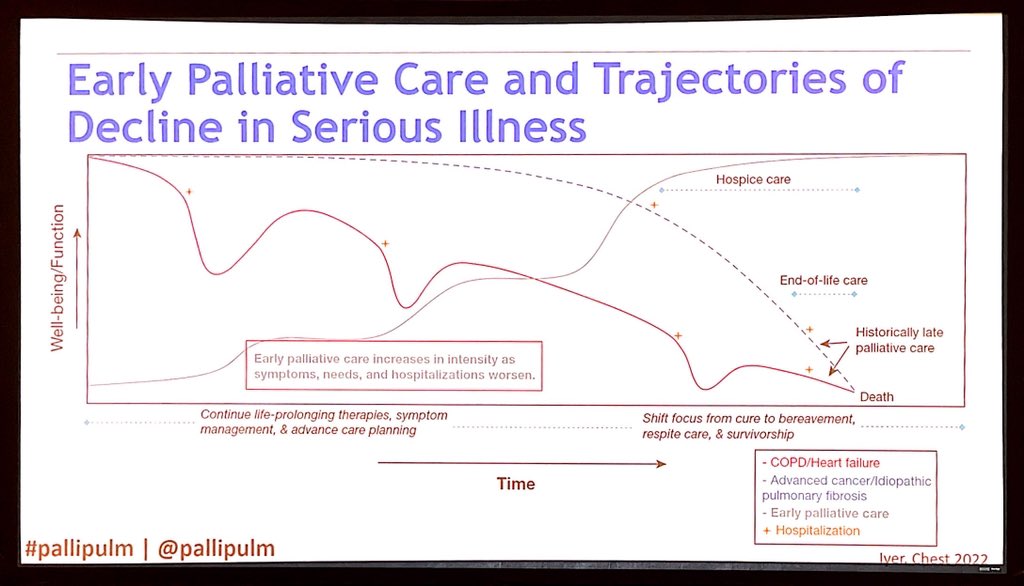
If any of these levels change and cross the threshold it should trigger a conversation. #ATS2022 

Conclusions! #ATS2022 

Next we have @JHartMD with “‘She Won’t Ever Be The Same’: Sources of Prognostic Estimates, Where Our Predictions Originate, and How Bias May Prevail.” #ATS2022
Health expectations serve multiple purposes. #ATS2022 

When we seek information it can be for different reasons: instrumental, affective, and duty to know, and these reasons can change throughout life. #ATS2022 
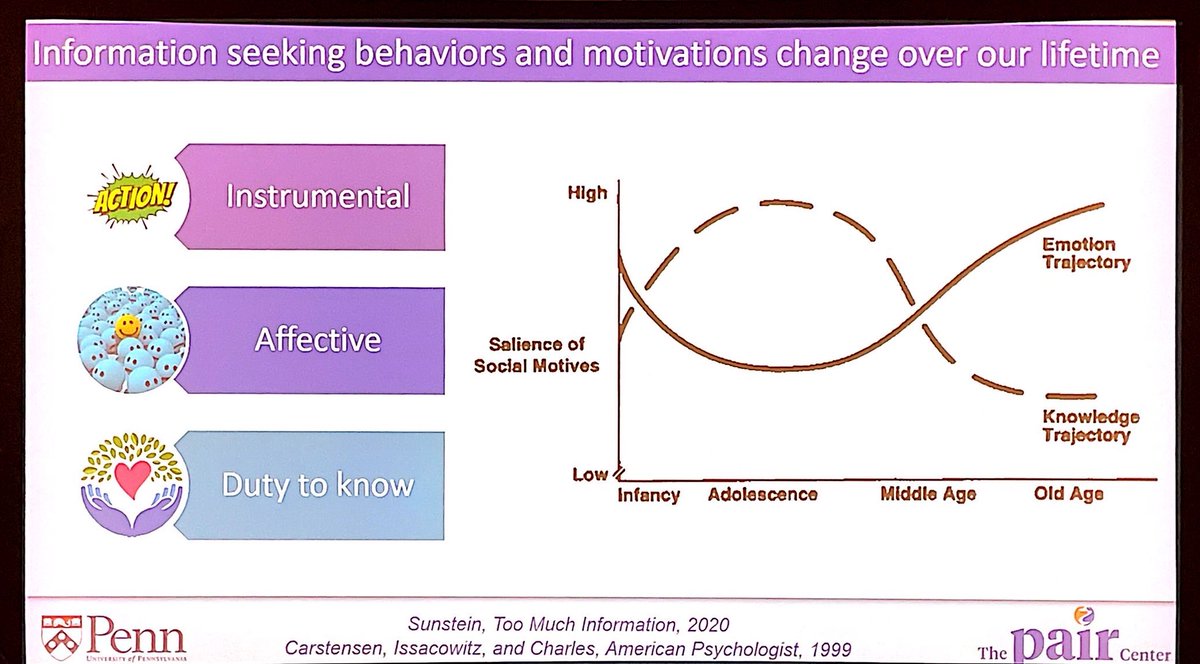
Prognostication is a complex process that relies on humans. #ATS2022 

Remember that all of the people in this process are humans, and hope is a natural part of the process. A single individual can hold very conflicting understandings of what they hope for and what they expect. #ATS2022 

We all use these cognitive shortcuts, but these biases can introduce flaws into our thinking and understanding . Optimism bias, negative impact bias, and present bias in particular, often play a role in understanding prognosis. #ATS2022 

We can help overcome these biases by not relying on only one person. #ATS2022 

There are also de-biasing training programs that can be done, especially using the humanities. #ATS2022 

Take home points! #ATS2022 

Next we have Dr. Douglas White with “‘We Told Her Family How Bad Things Are’: What Doctors Think They Say, What Surrogates Actually Hear.” #ATS2022
There is a growing evidence base that discordant expectations about prognosis are common and are consequential! Patients whose surrogates have discordant expectations use life support for longer without a change in survival. #ATS2022 

Why do these discordances exist? Are we having the necessary conversations? In 98% of taped conversations at least one prognostic statement was made. So we know we are disclosing. #ATS2022 
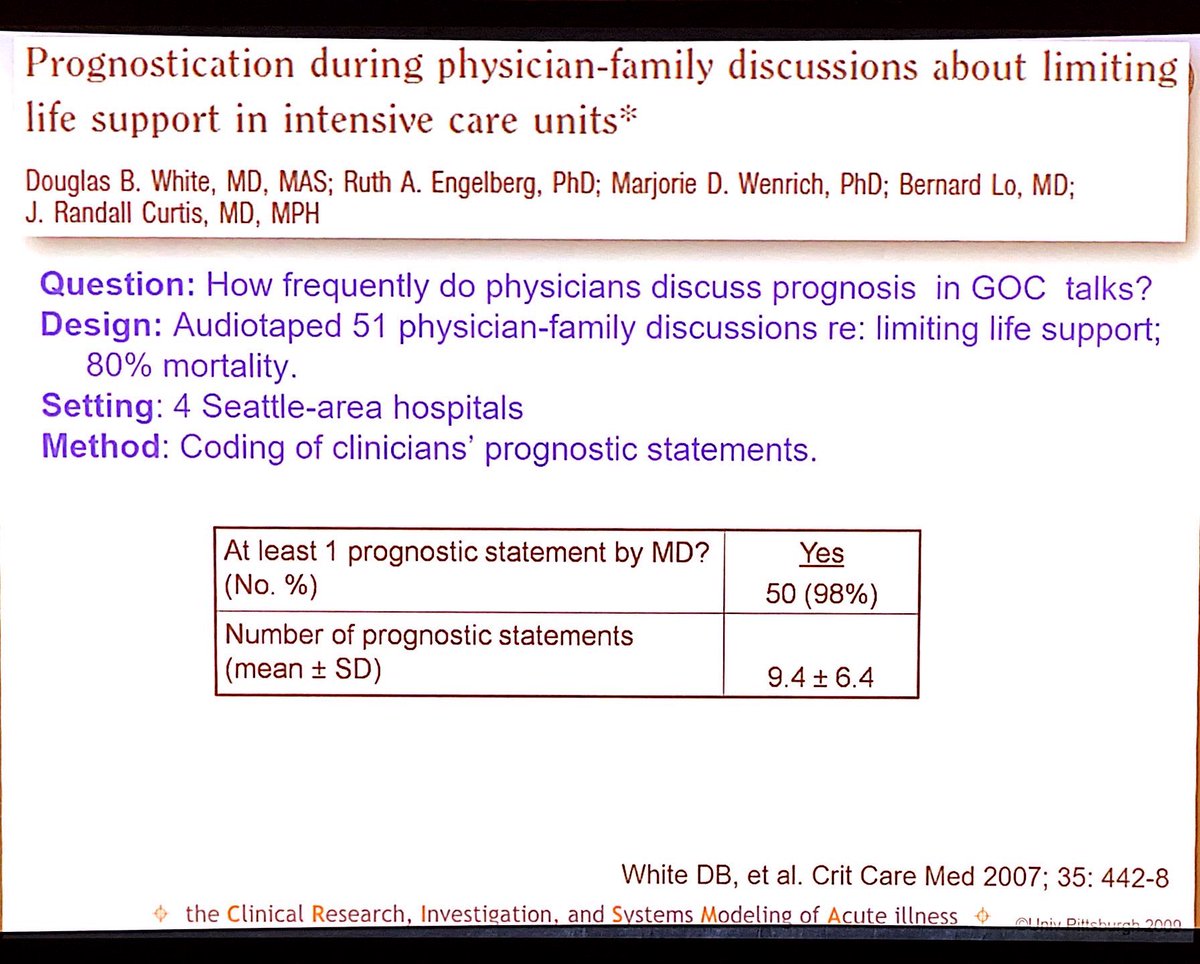
However, we may not be discussing some aspects (like survival and long term survival) as often as we should. #ATS2022 
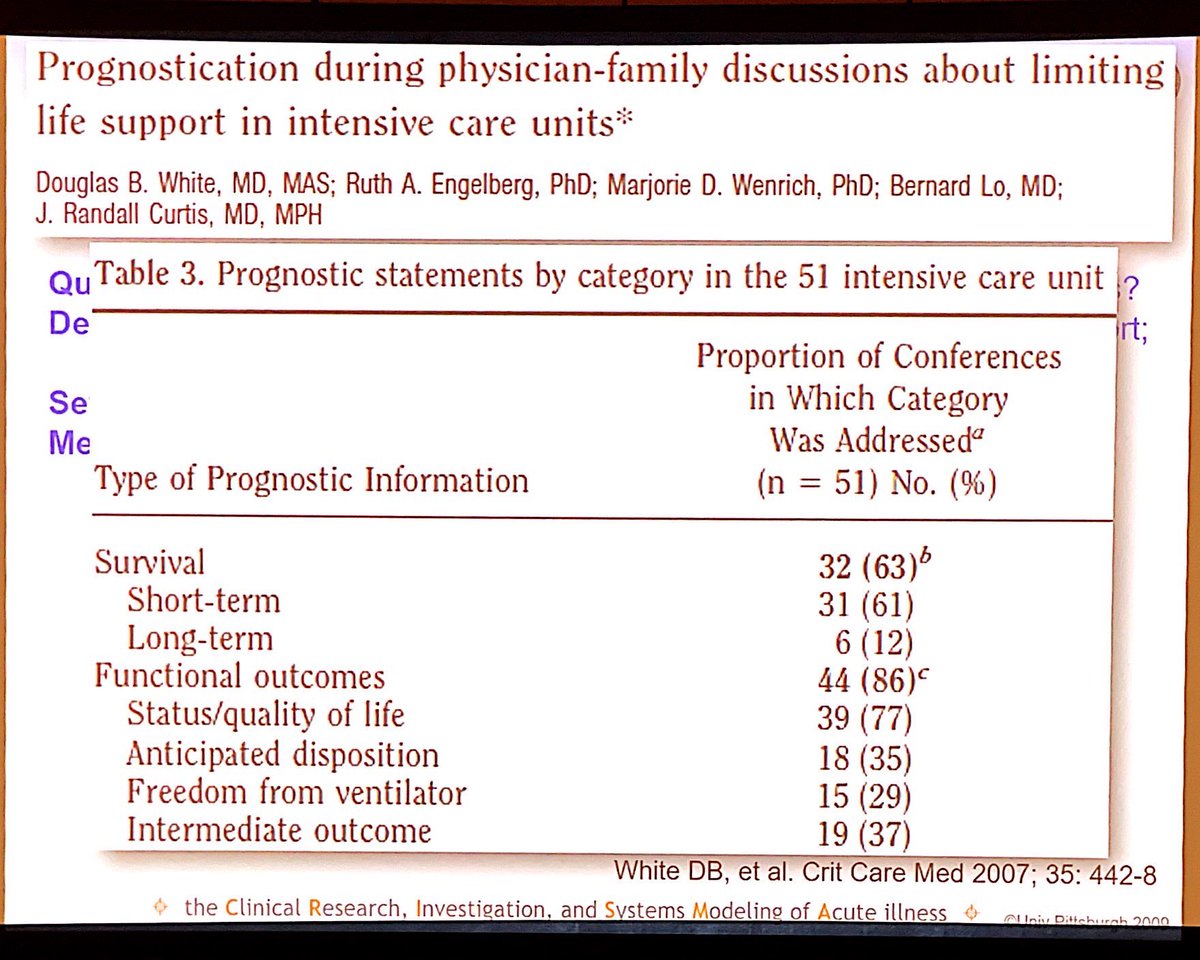
This study evaluated whether surrogates could comprehend the information they were presented with. #ATS2022 

There were very large discrepancies between what people understood. #ATS2022 

There is a big difference in what patients here and what they believe, and more discrepancy optimism was associated with lower trust in the healthcare team. #ATS2022 

This study found that more optimistic beliefs arouse from miscomprehension and differences in belief. #ATS2022 

This study identified reasons for overly optimistic estimates by surrogates. The most common reasons were the surrogates believing they knew the patient better, religious beliefs, and defensive processing of prognosis. #ATS2022 

Conclusions! #ATS2022 

Next up is Dr. Crystal Brown with “Centering the Margins: Addressing Inequities in Patient-Clinician Communication.” #ATS2022
There are racial inequities in serious illness and end-of-life care. #ATS2022 

Public health critical race praxis #ATS2022 

This is a study she is currently doing. #ATS2022 





She found these five themes. #ATS2022 







Themes and quotes continued. #ATS2022 







Conclusions! #ATS2022 

Next we have Dr. Negin Hajizadeh with “Tools to Support Shared Decision Making Conversations: The Promise and Limits of Decision Aids.” #ATS2022
The ultimate goal is to achieve “shared mind.” #ATS2022 

The goals of decision aids. #ATS2022 

There is evidence that decision aids WORK. #ATS2022 

Best practices for communicating risk. #ATS2022 

Example of risk communication. #ATS2022 

Use visual formats to reduce biases. #ATS2022 

Precision data is often rejected by patients. #ATS2022 

Reasons why people do not believe the data they are presented with. #ATS2022 

This is a decision aid for whether to proceed with mechanical ventilation. #ATS2022 





It was found to be feasible, effective, and enhanced communication. #ATS2022 

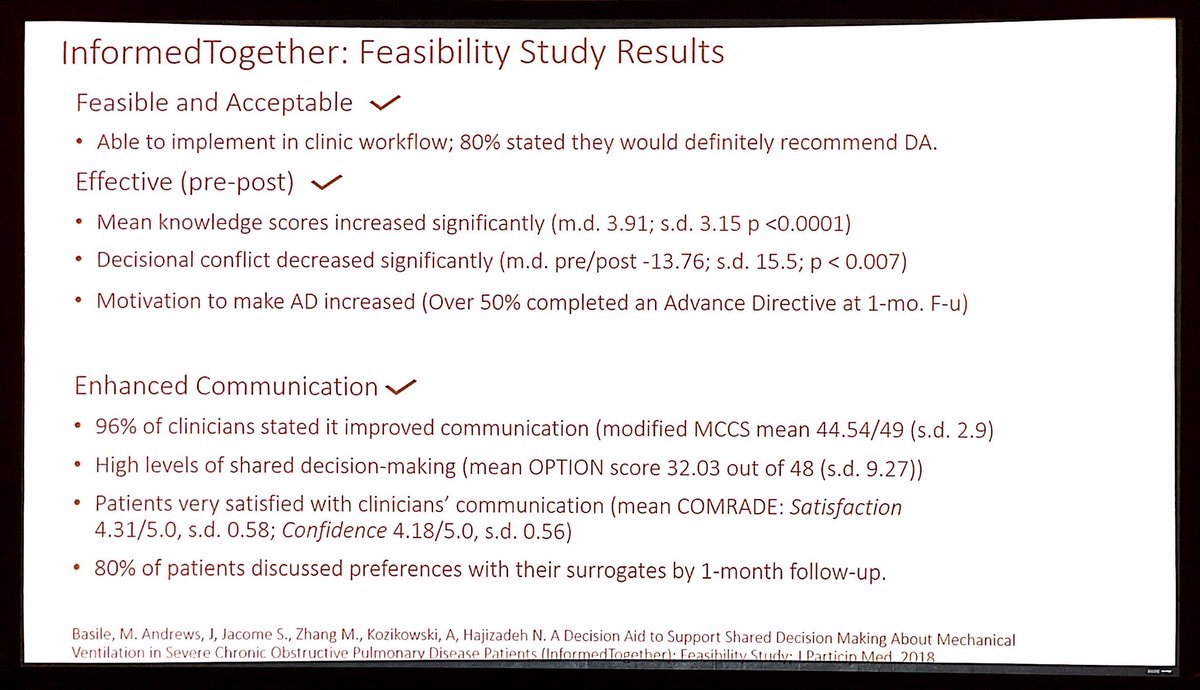

Another decision aid for mechanical ventilation. This tool was not very effective. #ATS2022 





There are different types of knowledge that people bring to the table. #ATS2022 

Summary points! #ATS2022 





Next we have Dr. Alison Turnbull with “Applying Data to the Individual Patient: Considering the Ethics of Prediction Modeling and the Patient-Physician Relationship.” #ATS2022 
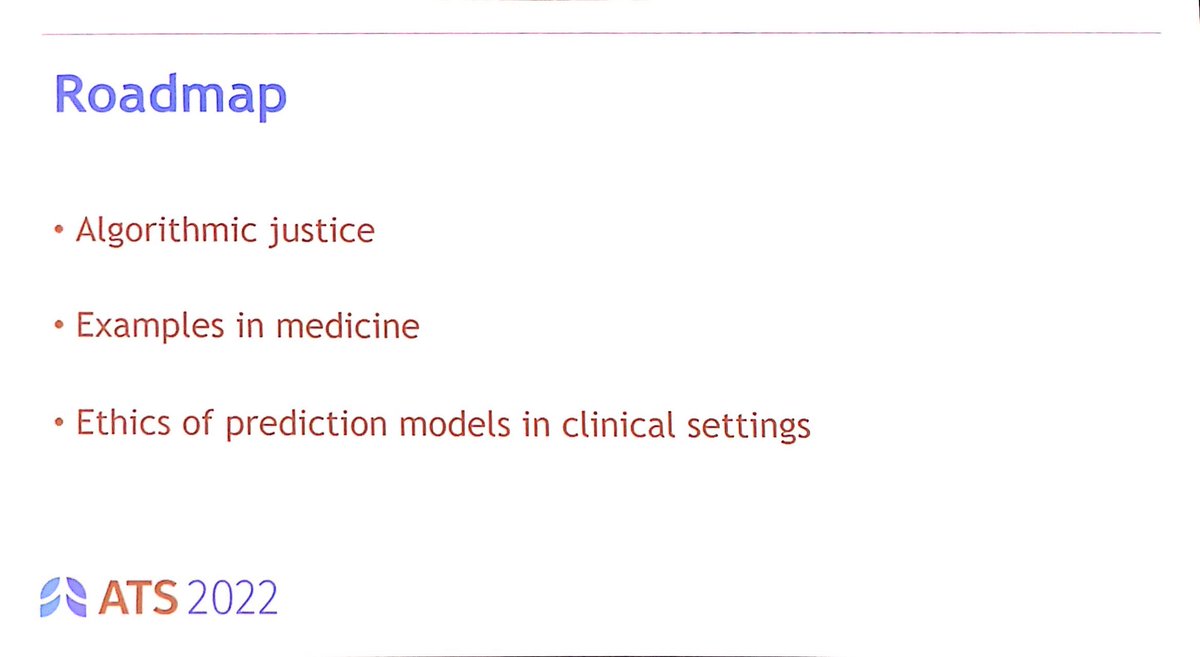
What is algorithmic injustice and where do we see it? #ATS2022 



Examples from medicine. Black patients were found to have a higher bar to be able to access the program - they had to be sicker. #ATS2022 

When race is considered in eGFR black patients get worse care!!! 😡😡😡 #ATS2022 

What is an ethical problem? #ATS2022 

Ethical conflict in clinical prediction #ATS2022 

This gets even shakier when doing predictions for marginalized groups. #ATS2022 

Take home points! #ATS2022 

Next we have @NnekaPhD with “Centering the Margins: Addressing Inequities in Patient-Clinician Communication.” #ATS2022
We know that there is significant power in first impressions, both for us and the patient. #ATS2022 

Context is so important and we need to acknowledge these things! #ATS2022 

Things to remember! #ATS2022 

The goal is to lead with empathy, and that will increase trust and improve communication. #ATS2022 

• • •
Missing some Tweet in this thread? You can try to
force a refresh












